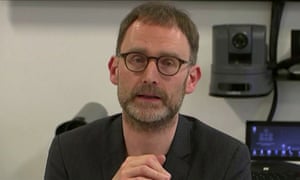e
It's not just Neil Ferguson – scientists are being attacked for telling the truth
The media vilification of the government adviser is about far more than social distancing
 ‘Neil Ferguson has been under attack since his team suggested hundreds of thousands of deaths were possible.’ Photograph: Reuters
‘Neil Ferguson has been under attack since his team suggested hundreds of thousands of deaths were possible.’ Photograph: Reuters
Wed 6 May 2020 14.05 BST
T
he newspaper frenzy over Prof Neil Ferguson’s love life is just the latest example of a scientist who has been targeted for confronting parts of Britain’s political-media complex with evidence that it finds too difficult to accept.
There is no doubt that Ferguson, who sat on the government’s Scientific Advisory Group for Emergencies (Sage) before his resignation, was wrong to ignore the government’s social distancing rules. He has admitted as much, even if he did believe that he was at low risk of spreading the Sars-Cov-2 virus because he had already recovered from Covid-19.
But today’s lurid front-page headlines follow a campaign to discredit him by those ideologically opposed to government interventions, and who have used such tactics against scientists in other fields, particularly climate change.
It is a further sign that some media commentators and politicians favour a version of Britain in which politicians and newspaper editors dictate the public’s understanding of biology and physics.
Ferguson has been under attack ever since his research team’s modelling suggested in mid-March that hundreds of thousands of deaths in the UK from Covid-19 were possible if stronger efforts were not made to curb the growing epidemic.
Within a week, the prime minister announced the current lockdown measures. The move was perceived as a U-turn because the government’s chief scientific adviser had days earlier suggested that allowing widespread infection might be an option to achieve “herd immunity” across the country.
Ferguson’s contribution was initially praised, but it was not long before his reputation was under assault from parts of the media traditionally sceptical of a so-called “nanny state”.
On 28 March, the Daily Telegraph published an article alleging that “the scientist whose calculations about the potentially devastating impact of the coronavirus directly led to the countrywide lockdown has been criticised in the past for flawed research”.
The story relied on the views of a handful of critics of how Ferguson’s models were used by the then Labour government to tackle the 2001 outbreak of foot and mouth disease. The article failed to mention that Ferguson received an OBE in recognition for his important role in the crisis, or that he was afterwards elected a fellow of the prestigious Academy of Medical Sciences.
The next day, Peter Hitchens, in the Mail on Sunday, described the lockdown as “mass house arrest” and identified Ferguson as being “one of those largely responsible for the original panic”.
A few days later the Wall Street Journal published an article by two British commentators that argued “the coronavirus pandemic has dramatically demonstrated the limits of scientific modelling to predict the future”. It singled out Ferguson’s work and complained that “reasonable people might wonder whether something made with 13-year-old, undocumented computer code should be used to justify shutting down the economy”.
Bizarrely, this article was written by Benny Peiser and Andrew Montford, the director and deputy director of the Global Warming Policy Foundation, which was set up by Nigel Lawson in 2009 to lobby against climate change policies. The foundation has a track record of attempting to discredit climate models that show rising greenhouse gas levels risk warming the world to dangerous levels.
The promoters of climate change denial, which include some newspapers, are well used to attacking scientists whose work they do not like. Lawson’s foundation was launched just a few days after the publication in late November 2009 of emails that had been hacked from the Climatic Research Unit at the University of East Anglia. He and other so-called “sceptics” falsely suggested that the emails revealed misconduct by climate scientists.
Within a few hours of his work being misrepresented around the world, the head of the unit, Prof Phil Jones, started to receive threats against his life and the lives of his family. He later admitted that he had even contemplated suicide before numerous inquiries cleared him of any scientific wrongdoing.
It is fortunate that Jones did not succumb after such a concerted assault on his reputation. A similar ordeal apparently caused Dr David Kelly to take his own life after the biological weapons expert was hounded for revealing that the threat posed by Iraq’s weapons of mass destruction had been exaggerated by Tony Blair’s government.
Many other scientists in the UK working on issues that have implications for government policy know what it is like to be vilified, both publicly and privately, for their findings. They are regularly attacked by many of the British media commentators who are currently joining the pile-on to Ferguson.
It is time to put a stop to these media lynch mobs that risk driving Britain back into the Dark Ages. We must continue to base our decisions on the advice of experts such as Ferguson, and reject the irrational arguments of those who want political dogma to trump evidence.
• Bob Ward is policy director at the Grantham Research Institute on Climate Change and the Environment at the London School of Economics
Geen opmerkingen:
Een reactie posten
Opmerking: Alleen leden van deze blog kunnen een reactie posten.